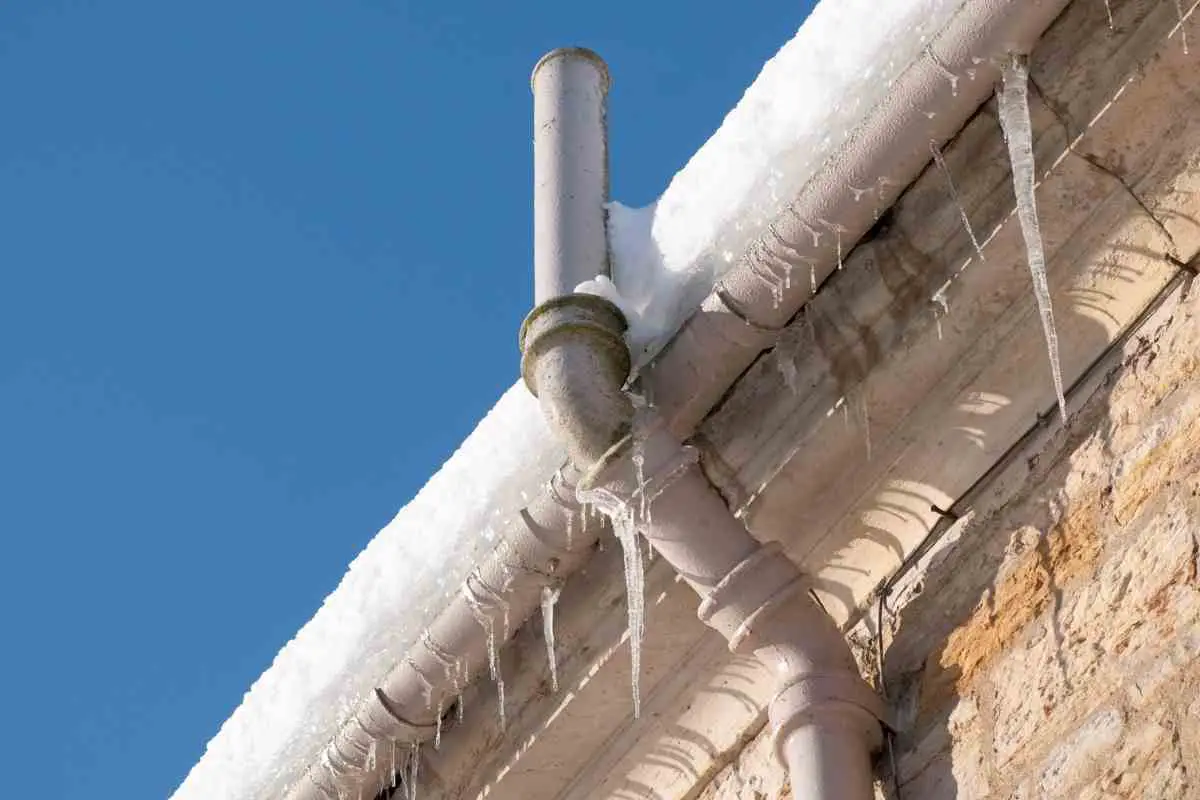Frozen gutters always signal bad news and could cause permanent damage to your roof and sidings.
To keep your gutters from freezing over the winter:
- Keep them clean
- Install a heating panel
- Install high-quality gutter guards,
- Add insulation to the roof
- Make sure that the gutters are slopped
- Remove snow with a roof rake
Icicles can cause significant damage to your home, especially if they form on rain gutters.
When water freezes, it expands, causing the gutters to warp and crack under the added pressure.
As such, ice dams on the roof can cause severe damage.
Melting snow that isn’t properly draining can also cause puddles around your foundation, resulting in basement leaks and other problems.
The best way to avoid gutter damage caused by ice is to prevent gutters from freezing or icing up in the first place.
Why Do Gutters Freeze?
Gutters that usually freeze are those positioned under trees.
Leaves and other debris originating from the trees can build over time.
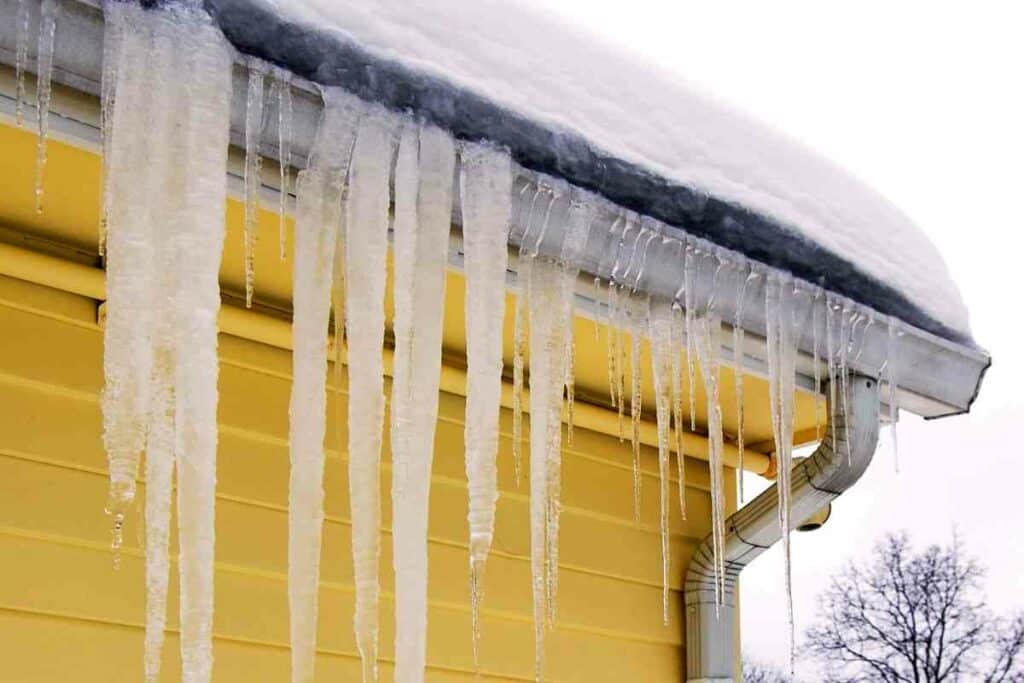
This buildup prevents water from flowing freely, eventually clogging your system. The blockage makes it easy for water to accumulate and freeze.
Because trapped snow and ice cannot escape even when it thaws, it refreezes and forms a thick layer.
Another reason a gutter may freeze is if snow or sleet accumulates.
There may be issues if snow accumulates in the gutter and freezes before it can melt and flow properly. This is usually the case in areas that get a lot of snow during the winter.
Tips On How To Prevent Your Gutters From Freezing In Winter
1. Keep The Gutters And Downspouts Clean
Clogging is the main reason your gutters freeze in the winter.

When debris such as sticks and leaves accumulate, they eventually form dams.
This then causes water to collect and freeze.
To Avoid This Problem – Ensure you clean your gutter during fall to keep your gutters from becoming clogged once the snow starts to fall.
Pay close attention to corners and junctions where leaves tend to accumulate.
Also, ascertain that your downspouts are cleaned as well. If your downspout does not drain properly, your entire gutter will freeze solid.
2. Install A Heating Panel
If you still have ice in your gutters despite your best efforts, installing a heating panel on the roof, with wires running the entire length of the roof and downspouts, is another way to prevent future freezing.
When you turn them on, they emit heat that melts ice or keeps gutters from freezing completely.
Works Best: Before deciding on a brand to buy your heating panel, read the reviews on major online retailers. A good set of reviews can point you in the right direction.
3. Install High-Quality Gutter Guards
Preventing debris from entering your gutters is the best way to ensure that your gutters and downspouts do not freeze due to blockages.
One of the ways you can achieve this is by installing a high-quality stainless steel mesh gutter guard system.
A gutter guard has a filtering effect on the roof when properly installed. It allows water to enter the gutters while also filtering leaves and other debris.
This prevents blockages and keeps water flowing; they also act as a shield, preventing snow from filling and compacting the gutters during the winter season.
Even Better – Some gutter guards include heating elements designed for cold-weather areas and can help thaw ice and melt snow.
4. Add Insulation To The Roof
When your roof or attic gets too hot, it melts the snow above it.
The snowmelt runs down the rooftop and refreezes as it reaches the edges with no warm roof beneath.
As a result, the water expands and pushes up against the roof shingles, causing damage.
To avoid this, insulate your attic. Insulation prevents heat from rising to the roof. It keeps you warm on the inside while keeping your roof cold.
To keep recessed lighting fixtures from heating your attic, insulate them.
Furthermore, ventilating the attic allows for proper air circulation, ensuring that the roof is evenly heated.
5. Make Sure That Your Gutters Are Slopped
Gutters are ineffective if the slope is too flat.
Water ends up collecting and sitting in the gutter system, which can cause it to expand and freeze during the winter.
Therefore, before the cold weather arrives, inspect your gutters.
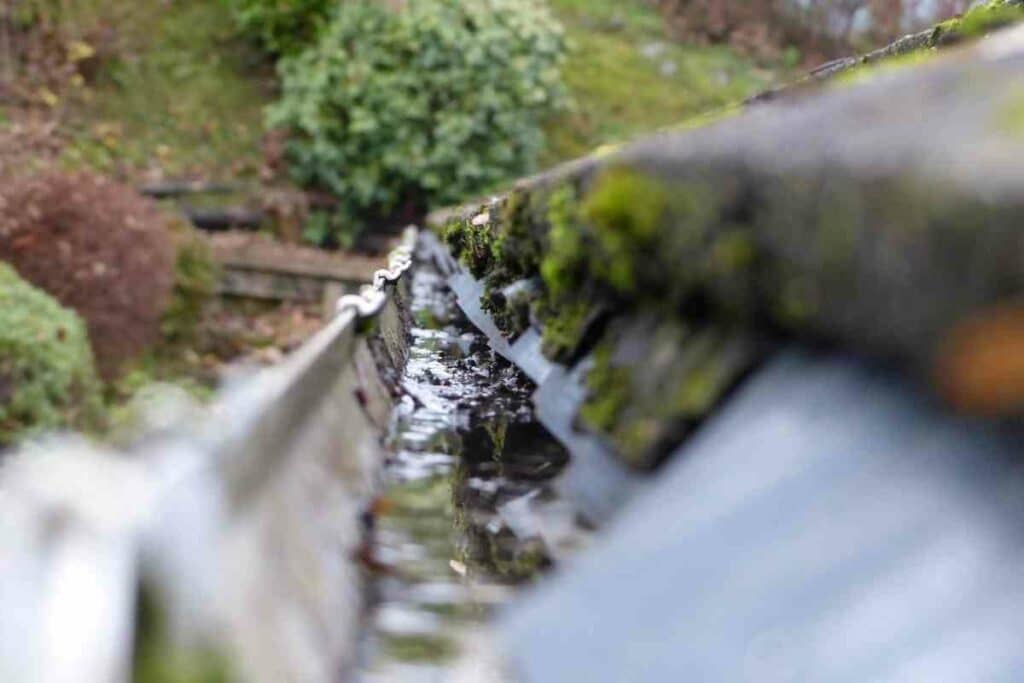
Using a tape measure, measure from the bottom of your fascia to the top of your gutter and mark down the measurement.
Continue to move down your gutters until you reach the downspout.
Your measurements should slowly increase from the beginning of your gutter to the downspout.
If the measurements increase, you have a slopped gutter system. If they don’t, you’ll have to readjust the system to increase water flow.
6. Remove Snow
Snow removal with a roof rake (an extended rake that can reach the roof to safely clear snow from the ground) will keep it from melting and freezing in your gutters.
If there is a lot of snow on your roof, clearing it as soon as possible prevents ice dams from forming.
Lower pitched roofs are more prone to snow accumulation, so if your roof isn’t too steep, you should consider removing snow as soon as possible.
Why Is Gutter Freezing Bad?
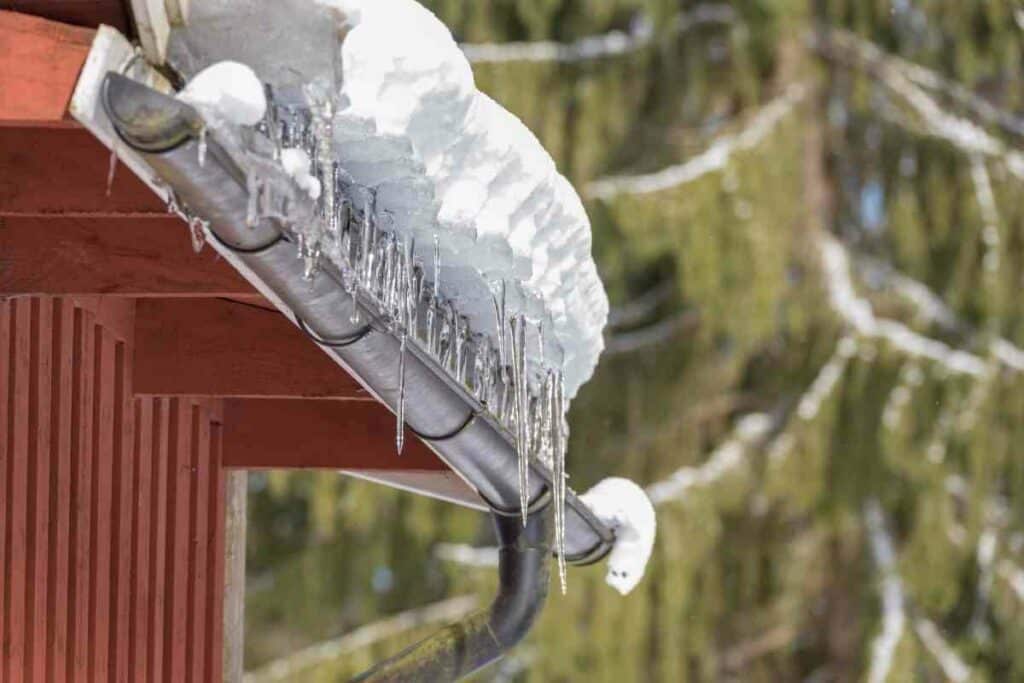
It Puts Pressure On Your Roof
Frozen gutters can damage your roof in a variety of ways.
When water freezes, it expands, causing gutters to separate from the house and eventually fall off.
There’s also the risk that the weight of frozen gutters will be too much for your roof. This could end up putting a strain on its load-bearing capacity.
Look Out! Frozen gutters, when combined with the weight of snow, have the potential to cause a roof to collapse, especially if the roof is older or already weak.
Structural Instability Poses A Risk
Another common danger of frozen gutters is compromising the home’s structural integrity.
If the gutters become clogged or frozen, water will seek alternative routes to escape, such as draining over the top of the gutters and down the side of the house.
This can cause wall instability and water to pool at the house’s foundation.
As a result, cracks in the foundation can form, allowing moisture to enter the home and resulting in mold infestations and flooded rooms if proper precautions are not taken.
Gutters Are Broken
Rain gutters that have frozen are vulnerable to damage.
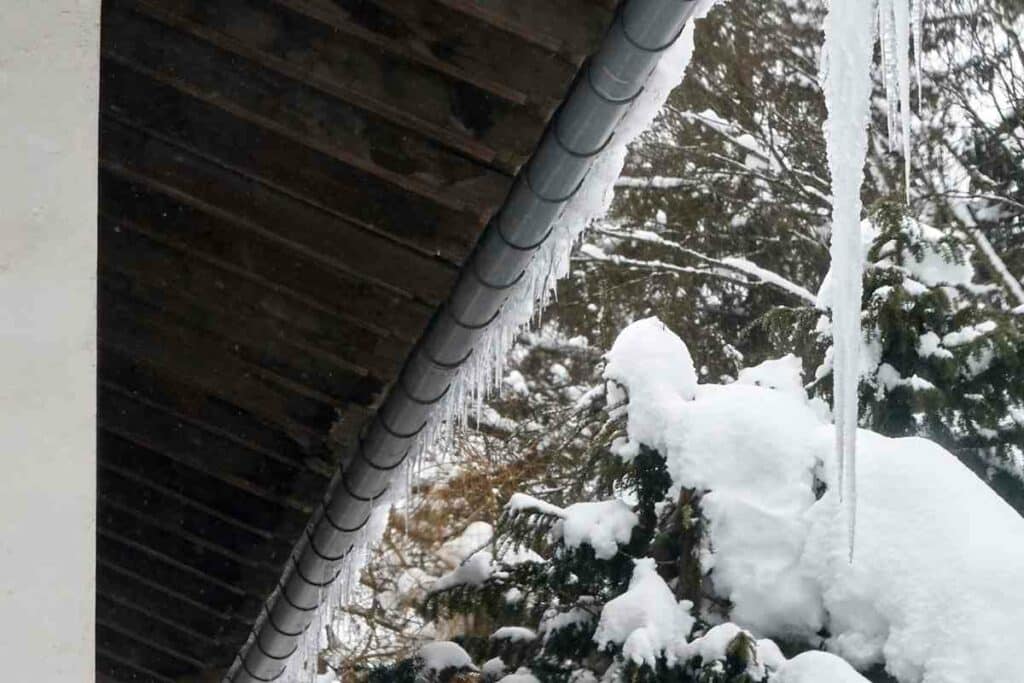
The material isn’t designed to withstand the expansion and contraction that your gutters experience when they freeze.
In particular, the joints and seams are more vulnerable. As water accumulates above the frozen gutter, the material becomes more prone to rust.
Roof Rot
When wood is exposed to water, the underlayment and structural materials beneath your roof become prone to rot.
Any wood structure that begins to rot is no longer structurally sound and poses a severe safety risk, particularly when exposed to high winds or winter weather.
Excellent Advice – If you suspect your roof has become wet beneath the shingles, it’s critical to schedule a thorough roof inspection with professionals.
Mold Can Grow Due To Indoor Humidity
A lack of adequate ventilation is one of the underlying causes of ice dams, which leads to humidity in the attic—another issue that goes hand in hand with a clogged gutter.
Mold can quickly grow in your attic, posing health and safety concerns.
Leaking Roof
When your gutters are frozen, melting snow on your roof has nowhere to go.
Moisture is pushed back beneath the shingles, potentially contributing to leaks elsewhere in the house.
Water damage is difficult to control and also costly to repair.
Insulation Could Be Harmed
When attic insulation is exposed to water, it does not fare well, especially if the exposure is prolonged.
Like almost everything else in your home, insulation is extremely susceptible to mold growth.
However, once wet, it quickly loses its insulating properties. If your insulation has gotten wet, you should replace it as soon as possible.
What Should You Do If Your Gutters Are Frozen Cold?
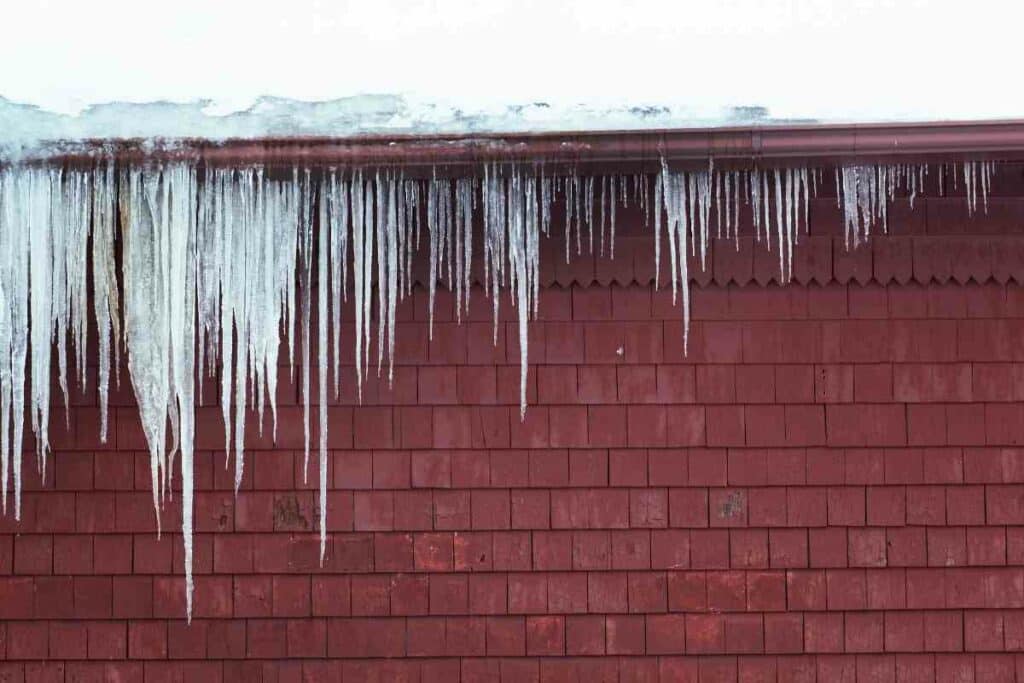
Use Hot Water Or Steam
Unless you can run a hose from a hot water source, you’ll have to use pots, pitchers, pots, or similar containers to dump the water onto your gutters repeatedly.
However, this can be inconvenient and time-consuming.
Therefore, hiring a professional is the only sure way to melt the ice.
Many contractors use equipment that injects steam or hot water into your gutters and downspouts.
Heat Tape
Heat tape could melt the ice dam if there has been light snow.
However, if there is a lot of snow, heat tape will cause the ice dam to move higher up the roof, making it more challenging to repair.
Also, heat tape will only exacerbate the drainage problem if your gutters are clogged with leaves or frozen solid.
Therefore, ensure your gutters are not clogged with debris before proceeding.
Use A Chemical De-Icer
Another solution you can utilize is the use of a chemical de-icer.
Consider incorporating Magnesium Chloride De-icer into your gutter system.
If you notice icicles forming in your gutters, sprinkle it inside your gutters with a small cup. This helps prevent freezing, ice buildup, and snow accumulation in your gutters.
Keep In Mind – Never use rock salt (sodium chloride) or other de-icing agents in your gutters. Table salt, Epsom salt, and sea salt are all corrosive to metal.
Furthermore, the runoff through the downspouts is also harmful to pets and plants as these salts are toxic.
Use Your Hands
Finally, ice can be removed by hand.
You can use various hand tools, such as ice picks or an awl.
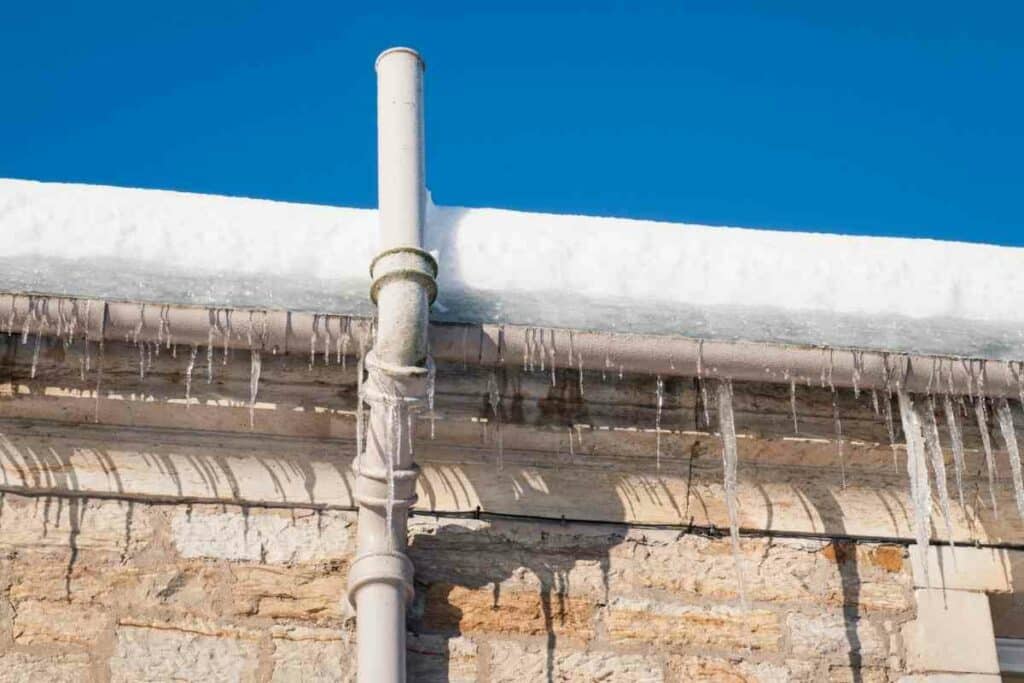
When chipping away at the ice, use caution to prevent damaging the gutters or roof tiles as you work.
The only drawback to this method is that it does not allow you to remove ice buildup from your downspouts.
Heads Up! Don’t try to use force. Please don’t break up the ice with a hammer or a bat because it will cause more harm than good.
Final Thoughts
Gutters are essential for diverting water away from the house and its foundation.
Without a properly functioning gutter system, you may experience water damage, foundational and structural issues, mold and mildew, deteriorating landscaping, etc.
If these issues are not addressed, it may result in costly repairs.
Maintain regular gutter cleaning to keep leaves, twigs, pine needles, and other debris from clogging them.
Otherwise, roof runoff will freeze in the rain gutters.
